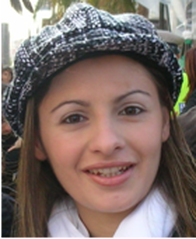[Research Projects’ Involvement]
I am the principal investigator of the FeSTEM project (2019-2021) funded by Erasmus+. FeSTEM aims to promote an innovate method and pedagogy that will allow Higher Education students and instructors to use traditional and computationally-rich media to create meaning, shareable exhibits that will act as mentoring models for encouraging girls and women to remain active in STEM. Previously, I was the prinncipal investigator of WomenPower project (2014-2015), supported by Mahallae (funded by UNDP-ACT), aiming at the design, development, and evaluation of a platform to connect women mentors and mentees in the fields of academia, business, healthcare and technology. I am also involved in the Network for Social Computing Research (NOTRE) project, funded under Horizon 2020 Twinning programme (2016-1019). NOTRE project aims to develop a network that will strengthen and enhance the research and innovation potential and capability of the newly established Social Computing Research Centre (SCRC) at CUT for stimulating scientific excellence and innovation capacity in the area of Social Computing. Previously, I worked as a researcher (2011-2014) on LUCIDE, a project supported by European Commission, designed to develop ideas about how to manage multilingual citizen communities across the EU and beyond. You can view some of my work in the projects’ section.
[Research Interests]
My general research interests are on technology, language learning and social learning with with a focus on the pedagogical study of digital artifacts from a social and humanistic perspective. More specifically my research interests are on the topics of:
- Digital pedagogies in the Humanities
- constructionist learning via emerging technologies
- learning design with emerging technologies for equality and social inclusion
- Computer-Assisted Language Learning
- Emerging technologies for supporting collaboration in online communities
- Cultural differences in the use of online social communities
- Technology for social inclusion
- Intercultural education
[Emerging Technologies and Communities]
I am fascinated by the social dimensions of computing and specifically by the use of emerging technologies as instructional tools. This aspect involves exploring how groups of learners interact with their peers and with others with the use of emerging technologies in their effort to construct a meaningful artifact.
[Constructionism]
Constructionist theories of learning are a central influence in my research and teaching activities. I believe that technology enables the design of constructionist learning environments –spaces that support learning through designing, making and connecting and allow students make maximum use of their own cognitive potential. I believe that learning can happen most effectively when people are collaboratively active in making meaningful artifacts in the real world or in the world of the computer. Constructionism cuts through my research work, in exploring digital artifacts from a social and humanistic perspective, as well as my teaching. In my classroom, I endeavour in engaging students in challenging and authentic situations in which theory and practice are brought together with an aim of constructing a meaningful artifact.
Site updated in July 2021

